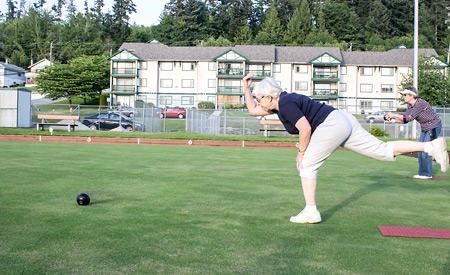Strange terminology, cryptic hand signals, history and mind-bending strategy. Everyone should be lining up to play, yet lawn bowling is perceived to be for the retired set. Why?
Although most members of Powell River Lawn Bowling Club are over 50 and retired, they’d like to bring younger members to the club.
“We are all young at heart here,” said retiree Marge Jackson, joking about being 29 as she takes her turn to organize teams for play with fellow bowler Brian Jackson.
Lawn bowling dates back to 13th century England and conjures images of white-clad ladies and gentlemen taking in an afternoons’ amusement. But don’t be fooled, club members are just as likely to be clad in grass skirts, especially at costumed Hawaiian nights held annually on the third Sunday in August.
Plenty of young people play lawn bowling in Canada, including the Canadian women’s national squad’s youngest member Pricilla Westlake, 19, from Tsawwassen. And just this year there’s an even younger member on the demonstration team, 14-year-old Jordan Kos from Saskatchewan.
Westlake herself, in a phone interview with the Peak, said she almost didn’t get to play the game because of her grandmother who told her it was, “only for old people.”
But Westlake, whose grandmother finally let her play at 14, said she was instantly hooked by how hard it was. And that challenge, she said, is what still keeps her in the game.
Recently returned from the World Juniors in Australia, Westlake said she enjoys travelling all over the world to play the sport she loves—although she hopes to retire at the ripe old age of 24 and focus on her chosen career, journalism.
While casual viewers may think lawn bowling appears to be an easy game, Westlake said, “The game is definitely harder than it looks.”
Here in the Powell River clubhouse, Jackson warns there’s a certain amount of strength needed. “You’ll have arms like Popeye when you start bowling.”
Although scored similarly to curling—with teams comprised of leads, skips and thirds—lawn bowling couldn’t be more different. The game also has nothing in common with other lawn sports like bocce or pétanque.
First there’s the terminology. All the activity happens on the pitch, a stretch of lawn, called a green. The stones are ball shaped but are most emphatically not balls, but bowls, the exception being the jack, or white cue-ball-sized sphere, that is the target of all the bowling. Simple.
Each player gets a number of bowls. Weighted on a bias, one side heavier than the other, the bowls curve as they roll so bowlers can position them around the jack. The team with the closest number of bowls to the jack wins.
On the surface the game seems easy, but as teams bowl back and forth along the green things can get complicated as the green fills up with strategically placed bowls. The skip’s job is to make it easier by using hand signs to show the bowler where to play.
Powell River’s club, open since 1921, is the sixth oldest in the province. Just up from the mill its membership roster, full when the mill was in full swing and fuller when women were permitted to join in 1936, has dwindled since the mill downsized.
Today the club is brimming with vivacity however, as members joke with each other about who will have to buy a round, beer or coffee and cake, after the game.
Enrolled with Bowls Canada Boulingrin, Canada’s national bowling organization, membership at the Powell River club brings access to a network of greens all across the province and Canada. Because of this network, the club has participated in tournaments over the years, travelling to Britain and South Africa as well as hosting international teams.
Acting as skip, Len Mimeault, tall and white haired, calls out plays with a series of ever-changing hand signals somehow intelligible to his teammates.
Watching those signals is what got Glenn Parkinson and his wife, both retired, interested in lawn bowling. “We were playing tennis right next door and got curious about what they were doing in there,” he said.
Complex strategy and the sport’s social aspects are what keep drawing the couple back for more.
“Initially we didn’t want to join, because we thought it was for old people” said Parkinson. “We waited until we thought we were old enough, but now I wish we had started right away.”
Parkinson said those interested in trying out the sport can come in and try for free, the only requirement being a pair of flat shoes to wear on the green.
“If you mess up nobody is going to jump on you,” he jokes, although pitching wobbly bowls, or “potatoes,” may result in a new player having to buy a round or two.
For more information readers can call Larry Strueby at 604.578.1212.



